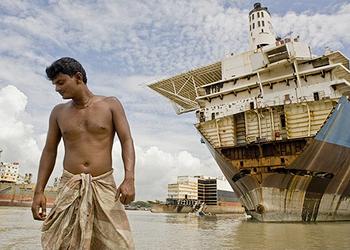
LONDON, UK, April 11, 2014 (ENS) – The International Maritime Organization and the Government of Bangladesh today agreed to improve safety and environmental standards in the country’s ship-recycling industry through cooperative efforts over the next 18 months.
A Memorandum of Understanding formalizing the cooperation between the two parties was signed by Nicolaos Charalambous, director, Technical Cooperation Division, IMO and Ashadul Islam, additional secretary, Economic Relations Division of the Ministry of Finance of the Government of Bangladesh.

IMO and Bangladesh will jointly implement a project entitled Safe and Environmentally Sound Ship Recycling in Bangladesh – Phase I.
With an annual gross tonnage capacity of more than 8.8 million, the Bangladesh ship recycling industry is one of the world’s most important, second only to neighboring India in terms of volume.
The agreement signed today demonstrates a major commitment from the Government of Bangladesh to improve safety and environmental standards within the shipbreaking industry, where deaths and injuries to workers have raised concerns about safety standards for years.
The most recent deaths occured on April 3, when four shipbreaking workers were killed and another three were critically injured when a gas cylinder exploded in a shipbreaking yard in Chittagong, Bangladesh.
“This sad accident shows the clear lack of safety measures in the industry,” Muhammad Ali Shahin, Bangladesh coordinator of the NGO Shipbreaking Platform said then. “Shipbreaking workers are not well trained, their work is not supervised and they are either not provided with safety gear or no checks are made to ensure that they are actually able to properly use protective equipment. It is very obvious that nobody feels responsible for these men’s lives.”
Yet, the IMO, the Government of Bangladesh, the Norwegian Agency for Development Cooperation, and the Secretariat of the Basel, Rotterdam and Stockholm Conventions have been working towards the establishment of the Safe and Environmentally Sound Ship Recycling in Bangladesh project for years.

The project, aimed at improving standards and sustainability within the industry, will consist of five work packages.
Studies on economic and environmental impacts and on the management of hazardous materials and wastes will be conducted under the new agreement.
There will be a review and upgrade of existing training courses.
Recommendations will be developed on strengthening the government’s One-Stop Service, in which all the ministries with a responsibility for ship recycling – Industries, Environment, Labour and Shipping – offer a single point of contact for all ship recycling issues.
And finally, Bangladesh and the IMO will develop a detailed project document for “a possible follow-up project to implement the recommendations of phase I.”
Today’s agreement will be executed by the Marine Environment Division of IMO in partnership with the Ministry of Industries of Bangladesh.
The Bangladeshi ministry will coordinate input from the different stakeholder ministries within the country, while IMO will also collaborate with other relevant UN agencies including the International Labour Organization and the United Nations Industrial Development Organization to ensure successful delivery of the project.
The principal funding for the project will come from the Norwegian Agency for Development Cooperation.
In addition, the Secretariat of the Basel, Rotterdam and Stockholm Conventions will also support the project by mobilizing some EU funding towards the work package related to the management of hazardous materials, which will partly be implemented by BRS.
These three international treaties are:
- the Basel Convention on the Control of Transboundary Movements of Hazardous Wastes and their Disposal, 1989;
- the Rotterdam Convention on the Prior Informed Consent Procedure for Certain Hazardous Chemicals and Pesticides in International Trade, 1998;
- the Stockholm Convention on Persistent Organic Pollutants, 2001.
The International Maritime Organization is the United Nations specialized agency with responsibility for the safety and security of shipping and the prevention of marine pollution by ships.
Copyright Environment News Service (ENS) 2014. All rights reserved.
© 2014, Environment News Service. All rights reserved. Content may be quoted only with proper attribution and a direct link to the original article. Full reproduction is prohibited.
